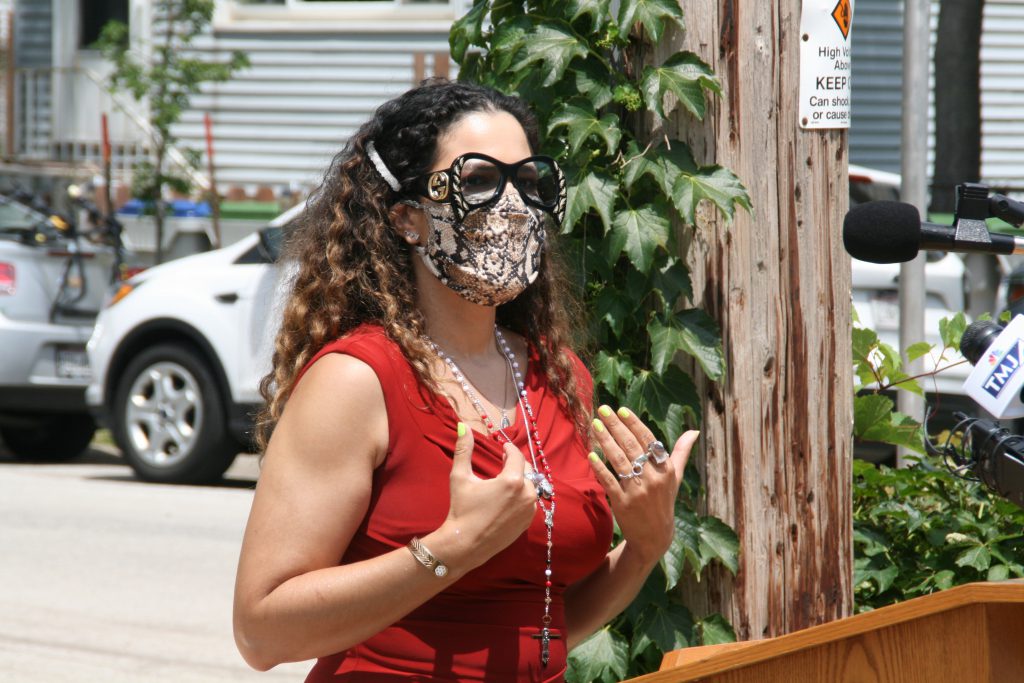Kowalik Still Resists School Reopenings
City health leader says schools must get approved plan to reopen, with precise rules still to come.

Milwaukee Health Commissioner Jeanette Kowalik at the mask mandate signing ceremony. File photo by Jeramey Jannene.
Milwaukee Health Commissioner Jeanette Kowalik is holding firm on a restriction on in-person classes for the fall.
Kowalik, during a press conference Tuesday, said a provision was inserted into the city’s phase four health order issued on June 25th that was intended to prevent in-person summer school.
Phase two had a restriction on in-person schooling, as did phase three, but guidance issued alongside phase three on June 4th said phase four would drop the restriction. “Mercury retrograde, whatever you want to call, we resolved it,” said Kowalik of inserting the restriction again in phase four.
Schools that submit a mitigation plan approved by the Milwaukee Health Department will be allowed to reopen, but the specific requirements of such a plan are still forthcoming. “That will be released between this week and next week,” said Kowalik.
Kowalik said when the restriction was reinserted in late June the data was trending in the right direction. Now things are going the other way.
Dr. Ben Weston, medical services director for Milwaukee County, said children are ready transmitters of the disease and their transmission networks would eventually reach adults. He said while an early belief was that the disease might spread slower in minors, a new study out of South Korea found individuals ages 10 to 19 have a high transmission rate that’s similar to adults.
“Our children can get a good education while we, as a community deal, with the pandemic,” he said, ticking off a list of needs including physical distancing, small class sizes and the need to wear masks. “In school as well as in public, masks should no longer be a debate.”
The city’s biggest school system, Milwaukee Public Schools, has opted to start the school year virtually and has adopted gating criteria for when to reopen.
But a number of choice and charter K-12 schools, as well as colleges, are seeking to reopen in person.
Kowalik said it’s appropriate and a science-based approach to not allow schools to reopen at will. She said the restriction was originally reinserted because of the lack of guidance from the state Department of Public Instruction (DPI) and federal Centers for Disease Control and Prevention (CDC). “Without those two documents we didn’t feel like it was appropriate to allow schools to open,” said Kowalik. DPI has now released its guidance, but she said guidance from the CDC has been delayed.
One of the things that needs to be established is what to do when a teacher or student tests positive for the disease. “All of that needs to be outlined,” she said.
Kowalik said the city has two individuals reviewing the plans currently, but plans to add more using federal CARES Act funding.
Another issue might prevent schools from letting all students back in: vaccinations. “Whether you believe in them or not, science works,” said Kowalik. But the pandemic has slowed the number of students receiving them. At a variety of ages, students must receive vaccine shots. She said health department data shows that only 60 percent of students have received the necessary vaccinations to begin the school year.
The lack of vaccine shots is a likely indicator of another public health problem in Milwaukee: lead poisoning. There, too, families may not be getting tested. “We are assuming that lead tests are down as well,” the commissioner said, promising to have specific data in the coming week.
Kowalik, perhaps nudging the media to file a records request, said she has received many angry emails from non-residents. “You’re entitled to your opinion,” she said. “But when you email or send messages to public officials those are public records.”
If you think stories like this are important, become a member of Urban Milwaukee and help support real, independent journalism. Plus you get some cool added benefits.
More about the Coronavirus Pandemic
- Governors Tony Evers, JB Pritzker, Tim Walz, and Gretchen Whitmer Issue a Joint Statement Concerning Reports that Donald Trump Gave Russian Dictator Putin American COVID-19 Supplies - Gov. Tony Evers - Oct 11th, 2024
- MHD Release: Milwaukee Health Department Launches COVID-19 Wastewater Testing Dashboard - City of Milwaukee Health Department - Jan 23rd, 2024
- Milwaukee County Announces New Policies Related to COVID-19 Pandemic - David Crowley - May 9th, 2023
- DHS Details End of Emergency COVID-19 Response - Wisconsin Department of Health Services - Apr 26th, 2023
- Milwaukee Health Department Announces Upcoming Changes to COVID-19 Services - City of Milwaukee Health Department - Mar 17th, 2023
- Fitzgerald Applauds Passage of COVID-19 Origin Act - U.S. Rep. Scott Fitzgerald - Mar 10th, 2023
- DHS Expands Free COVID-19 Testing Program - Wisconsin Department of Health Services - Feb 10th, 2023
- MKE County: COVID-19 Hospitalizations Rising - Graham Kilmer - Jan 16th, 2023
- Not Enough Getting Bivalent Booster Shots, State Health Officials Warn - Gaby Vinick - Dec 26th, 2022
- Nearly All Wisconsinites Age 6 Months and Older Now Eligible for Updated COVID-19 Vaccine - Wisconsin Department of Health Services - Dec 15th, 2022
Read more about Coronavirus Pandemic here





















